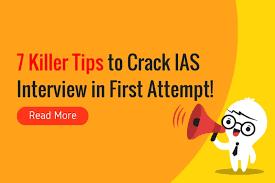Ace Your IAS Interview with These Golden Tips and Tricks

After the Preliminary and Main examination, an
IAS interview round, also known as the Personality Test, plays the most crucial
role. However, if you also want to ace your IAS interview, you must know some
tips and tricks. Acing your IAS interview is now possible with these golden
tips and tricks.
Keep reading this blog and learn all the golden tips and tricks you must know to ace your upcoming IAS interview.
1.Prioritize the interview round like your Prelims and Main
Like the Prelims and Main examination, the Interview also carries great scores for your entire UPSC examination; in fact, it decides your final destiny. There is nothing unfortunate than coming so far and failing to impress the front panel with a bad interview. Therefore, keep the same level of attention to this round from the beginning of your IAS preparation journey. Along with preparing for your Prelims and Main examination, make sure you go through essential IAS interview questions for a hassle-free interview round in the future.
2. Make sure to go through your biodata multiple times
Generally, the UPSC interview questions revolve around the biodata of the candidate. Therefore, before you opt for an IAS interview, go through your biodata first. Also, ensure that you have not incorporated false information about yourself. Please note that you can be asked tricky questions, such as, “why did you opt for this course after your boards?”, “why do you want to become an IAS?”, etc. So, prepare for these questions in advance of the interview session so that you can answer all questions confidently.
3. Develop self-confidence
The IAS interview is all about asking
candidates simple yet tricky questions to analyze how confident they are in
their personal lives. Therefore, no matter how nervous you are, you must be
extremely confident while answering their questions. Additionally, always
remember that the main reason behind an interview is to test your personality.
Hence, before you get asked for an interview, always practice prior, and if
necessary, get enrolled in an IAS institute to understand IAS interview
questions and related facts.
Also, read Factors to Consider Before Getting Enrolled in an IAS Coaching Institute here.
4. Improve your communication skills
The IAS interview round takes around 30 minutes for each candidate. Therefore, you should always get ready with better and more effective communication skills to give your best shot within those few minutes. If you waste your time searching for words and making sentences in your mind, your time will get over even before you start expressing yourself clearly. So, practice with the UPSC interview questions while preparing for the first two inevitable rounds. Practice in front of a mirror and with your friends for an easy result.
5. Reading newspaper
A massive number of IAS candidates stop reading newspapers daily after finishing their Preliminary and Main examinations. But, be wise, and keep reading newspapers regularly since current affairs are an inevitable part of the IAS interview round as well. The front panel may ask your opinion on recent events from last year. Therefore, reading newspapers and serially remembering events is a must for an ISS interview session.
6. Revise your optional subjects
Again, a vast number of IAS candidates leave their optional subjects behind after passing the Preliminary and Main exams. But, do you have any idea how much impotent role the optional subjects play in the interview round? Well, it is true. The IAS interview questions tend to encompass a few questions from your optional papers. Interviewers examine your knowledge about the subject and other factors through these questions. You may also get asked why you selected that subject as optional. If you manage to give a prominent answer, it will surely impress them. So, rather than saying goodbye to the optional subjects, keep reading them, even after the mains.
7. Be true and be yourself
The last but most crucial tip for acing your
IAS interview round is to be genuine, honest, and authentic as far as
applicable, and be yourself. Do not try to pretend since interviewers can
easily identify whether you are fabricating or not by your body language.
Additionally, do not answer conventionally like others; try to prove yourself
different from the crowd. Finally, do not copy-paste the answers from the
internet; add your own creative touch and keep them genuine and reliable.
Conclusion
Post Your Ad Here
Comments